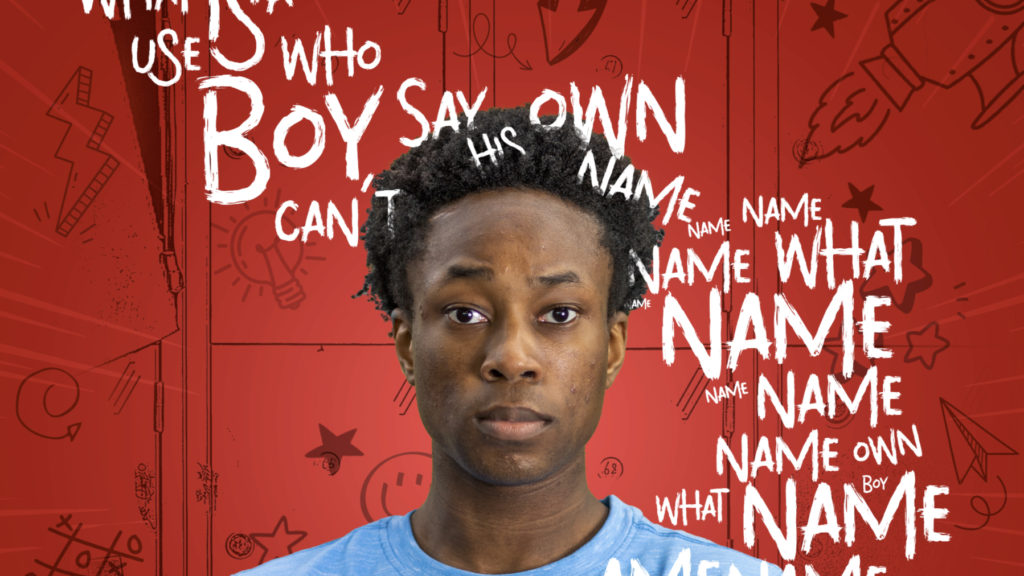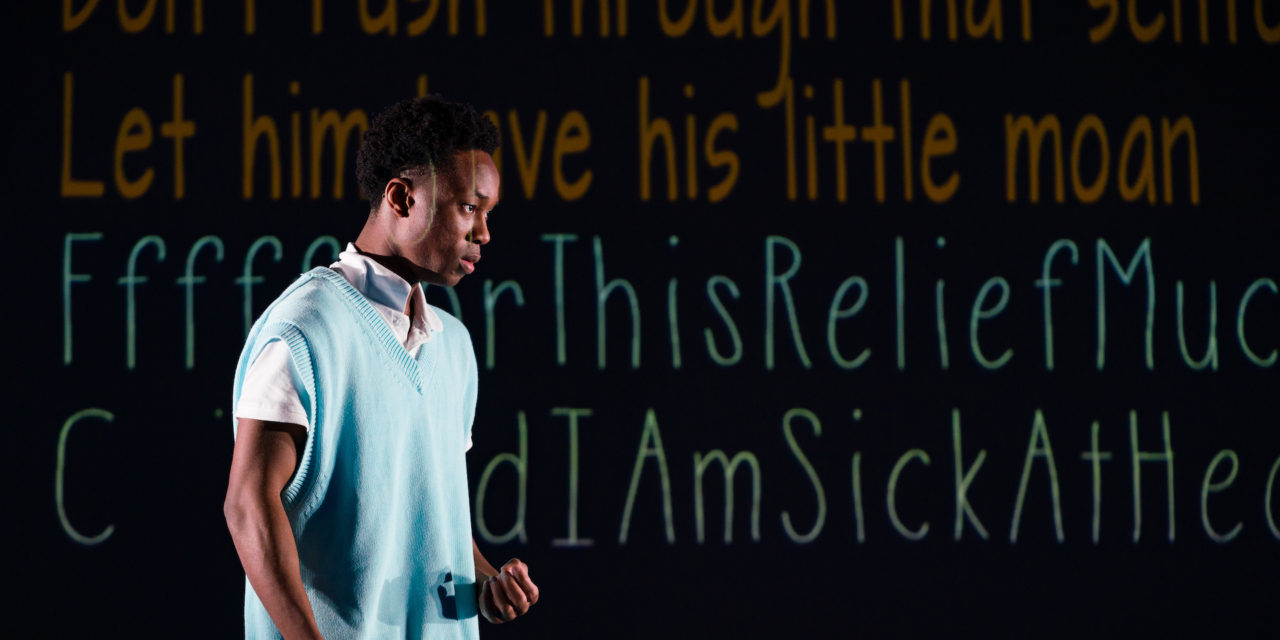
5 – 26 March
Written by Bristolian Ross Willis when he was twenty years old, Wonder Boy is jam-packed with youthful exuberance. Directed by the ever-imaginative Sally Cookson, and making ground-breaking use of creative captioning by Tom Newell, this show embraces inclusivity without being in the least bit pious about it. Shot through with very robust humour, it delivers a powerful message about our basic need to communicate, and how an inability to speak can lead to soul-destroying feelings of isolation and rejection. After all, we are often rather glibly defined as ‘the talking animal’, so what are you if you can’t speak?
Katie Sykes’ clever set design features an asymmetric blank wall edged in blue light, looking very like the framing of an illustrated panel in a comic book. This is highly appropriate, for Wonder Boy is the story of twelve-year-old Sonny, rendered silent by a debilitating stammer, who uses his skill at drawing to retreat into a comic book world of his own invention. Here, his imaginary friend is Captain Chatter, a superhero whose special ability is to communicate entirely through body language, facial expression and gesture. Making his stage debut, Raphel Famitobe is mesmerising as Sonny, a young lad struggling to express himself, but inhibited as much by deep feelings of shame as he is by his stuttering efforts to speak. Ramesh Meyyappan skilfully creates Captain Chatter, a silent, comforting alter ego that Sonny may nevertheless need to abandon if he is to break free and discover that he has things he must say.
In the real world, Sonny’s best friend is Roshi, played as an uninhibited powerhouse of energy by Juliet Agnes. Roshi is quite sure that Sonny will have no problem playing a bit part in the school’s drama club performance of Hamlet. Her own highly judgmental summary of that notoriously complex play, delivered at breakneck speed and cheerfully devoid of nuance, is a comic highlight. I had never previously thought of Hamlet’s mother as a ‘personality vacuum’, but perhaps I need to think again for, as embodied by an actor with Ms Agnes’ degree of persuasive power, Roshi could convince me of anything.
The drama club is an enlightened alternative to school detention initiated by Miss Wainwright, a teacher who, God forbid, actually likes children. She is played with utter conviction by Amanda Lawrence, who quite brilliantly conveys the idea that this is a teacher who ‘gets’ kids; one who sees the world from their perspective and who truly loves them, in an unshowy, self-deprecating manner that is entirely free from gooey sentiment. Her scenes with Sonny, where she demands of him that he should believe in himself, have a thrilling authenticity. In a play centred upon the power of words, it is perhaps ironic that the most moving moment of communication comes when Sonny gives Miss Wainwright a silent hug.
Played with gusto by Jenny Fitzpatrick, Miss Wainwright’s nemesis is Miss Fish, a caricature of a Headteacher obsessed with bureaucracy. Although the idea of comic book heroes and villains runs through Wonder Boy, I feel the sub-plot of the monstrous, box-ticking Fish versus the all-too human Wainwright is something of a distraction, entertaining in itself, but diluting the emotional power of the central narrative. Jenny Fitzpatrick also plays Sonny’s mother, and their relationship is far more relevant to this story of loss, trauma and recovery.
Wonder Boy rattles along with energetic speed, leaving little time for reflection. However, it does leave one pondering the different roles played in our lives by spoken versus non-verbal communication. And those creative captions projected on the wall raise questions about just what happens when something audio is turned into something visual. Music, too, communicates in its own special way, and this production is enhanced by an atmospheric score delivered live from composer Benji Bower, performed together with his brother Will.
Wonder Boy is at the Bristol Old Vic until March 26th. Catch it if you can.
★★★★☆ Mike Whitton 11th March


